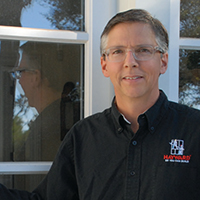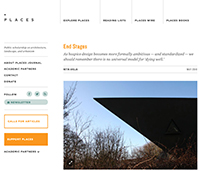“Healthy Homes,” from The Modern Architect
Produced by Modlar, The Modern Architect radio show + podcast features weekly interviews with architects, industry veterans, and thought leaders who are helping shape design. Hosted by Tom Dioro, the show is broadcast live every week on Stanford University’s KZSU and is available for streaming on Modlar. In S02 Episode 16, Bill Hayward (left), CEO of Hayward Lumber and Hayward Healthy Home in Carmel, California, shares how a previous health experience helped him to discover his passion for healthier homes and discusses how his home systems improve the health of inhabitants.
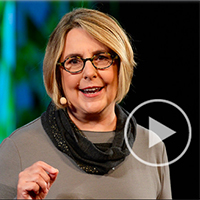
Most of our readers are familiar with TED Talks, which grew out of the TED (Technology, Entertainment, Design) Conferences that were held in Monterey, California, from 1990 to 2009, before moving to larger quarters in Long Beach. Readers may not know that the founder of the TED Conferences, Richard Saul Wurman, is an architect (as well as a graphic designer), a graduate of Penn from first years of Louis Kahn’s tenure there. Searching for TED Talks that combine architecture and health, we identified:
Robin Guenther, FAIA (shown), “Why Hospitals Are Making Us Sick,” TEDMED 2014
Jessica Green, “We’re Covered In Germs: Let’s Design for That,” TED2013
and
Michael Murphy, “Architecture That’s Built to Heal,” TED2016
Murphy is the founder of MASS Design Group, whose GHESKIO Tuberculosis Hospital is one of five recipients of the 2019 AIA/AAH Healthcare Design Award.
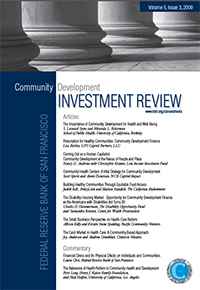
“Can community development finance help ‘bend the cost curve’ for health care?” This is one of the questions motivating a 2009 issue of the Community Development Investment Review, a publication of the Federal Reserve Bank of San Francisco. The opening article, by S. Leonard Syme and Miranda L. Ritterman of UC Berkeley’s School of Public Health, is on “The Importance of Community Development For Health and Well-Being.” While it looks at community development more broadly than the architectural scale, one of its goals is developing a model of preventative healthcare based on environments. Syme’s interest in effects of the environment on health go back to his early years at Berkeley, when he co-taught for many years with Professor of Architecture Roslyn Lindheim. Their seminal article, “Environments, People and Health” is featured elsewhere in this issue of arcCA DIGEST.
“End Stages” and “Frederick Law Olmsted and the Campaign for Public Health,” from Places
Places Journal is among the best contemporary sources of insight into the fields of architecture, landscape, and urbanism. Founded at MIT and Berkeley in 1983, it is published out of San Francisco by the editorial team of Nancy Levinson, Josh Wallaert, Deborah Lilley, and Frances Richard. Places’ articles range in form and length, bridging from the university to the profession to the public. Two articles from Places look at the relationship between the environment and health in two different periods and at two different scales: Nitin Ahuja’s “End Stages” (May 2018), considers hospice design and recommends that, as it “becomes more formally ambitious — and standardized — we should remember there is no universal model for ‘dying well.’” Thomas Fisher’s “Frederick Law Olmsted and the Campaign for Public Health” (November 2010) unearths lessons from Olmsted’s stint as head of the U.S. Sanitary Commission during the Civil War.
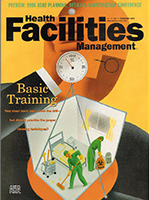
Health Facilities Management, published by the American Hospital Association, provides comprehensive coverage of the challenges facing the health facility design, construction and operations communities. In an article dated 4 April 2018, Frank Zilm, FAIA, FACHA and Kent Spreckelmeyer, FAIA, trace the evolution of three learning strategies for “Developing the next generation of health care architects.”

The Guardian is a British daily newspaper. As it describes itself, “The Guardian has no proprietor and just one shareholder, The Scott Trust. This unique ownership structure has safeguarded our editorial independence since 1936, and means any profits we make are reinvested in our journalism.” In “Urban health equity in all policies: a new science for the city” (18 March 2013), Jason Coburn, Professor of City and Regional Planning at UC Berkeley, describes the emergence of Health in All Policies programs, in which cities (including Richmond, California) commit to taking into account health effects in the development of all government policies.

